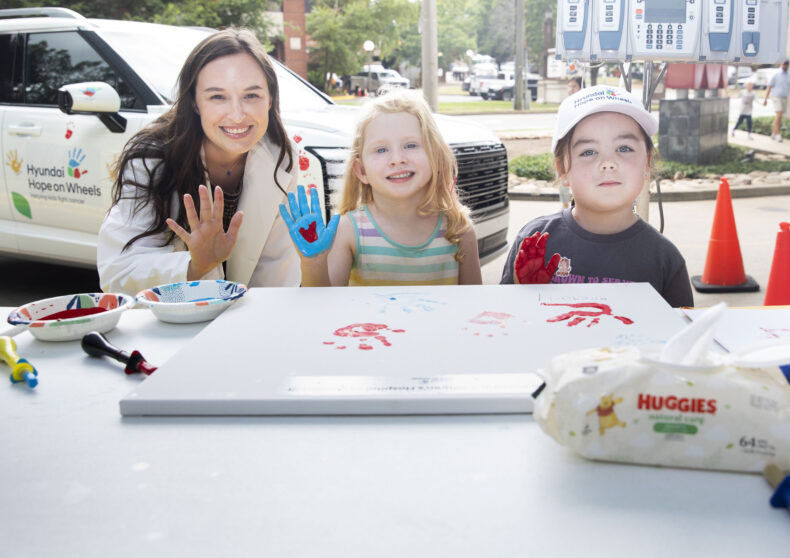
Adam Esbenshade, M.D., MSCI, assistant professor of Pediatrics in the Division of Pediatric Hematology/Oncology, has been awarded a $50,000 Hyundai Hope on Wheels Impact Award.
Esbenshade plans to use data to create a risk prediction model to predict blood stream infections in pediatric cancer patients.
The grant was celebrated in a “handprint ceremony” on Aug. 16.
To date, Hyundai Hope on Wheels has awarded more than $1.1 million in funding to pediatric cancer researchers at Monroe Carell Jr. Children’s Hospital at Vanderbilt. The company and local dealerships began their partnership with Children’s Hospital in 2007.
Esbenshade is one of 25 recipients of this year’s award, which is given to pediatric oncology departments at select children’s hospitals nationwide. He said his focus is to find a way to understand which patients are at risk for severe infections during chemotherapy and to find the best ways to treat them. He hopes a risk prediction model he is working on will eventually help oncologists around the country identify those patients.
“We’re now able to cure cancers we weren’t able to cure before, and we’re able to give therapies that are more targeted but with less side effects. With that, we still have a long way to go,” said Esbenshade. “In the end it’s about saving kids who otherwise wouldn’t be saved. We’re committed. I hate that the therapies I give have risks, but I am excited that there are now ways we can impact that. It’s huge what Hyundai does nationally, and it’s helped many of my colleagues around the country to advance care for childhood cancer.”

Representatives from the automaker and local dealerships joined Children’s Hospital leaders along with some of Esbenshade’s young patients to celebrate the grant award at a “handprint ceremony.” During the event, the children dipped their hands in paint and placed their colorful handprints on a white Hyundai Santa Fe to represent their personal stories of courage and hope.
“The Hyundai Hope on Wheels Program provides important support for pediatric oncology research in an era where funding from federal sources is limited and the advances that can be made in pediatric cancer are enormous,” said Debra Friedman, M.D., director of the Division of Pediatric Hematology/Oncology and E. Bronson Ingram Professor of Pediatric Oncology.
“Moreover, these grants provide funding for projects that will benefit from preliminary data to be competitive for larger federal awards and projects that can advance the practice of pediatric oncology. This year’s grant and Dr. Adam Esbenshade’s research are great examples of this.”
Since 1998, Hyundai has awarded more than $130 million toward childhood cancer research in pursuit of a cure.










